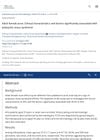TLDR Acne in adult women is often linked to polycystic ovary syndrome, especially in those who are younger, have premenstrual acne flare-ups, and irregular periods.
The study "Adult female acne: Clinical characteristics and factors significantly associated with polycystic ovary syndrome" investigated the clinical characteristics of adult female acne (AFA) and its association with polycystic ovary syndrome (PCOS). The study involved 208 patients aged 25 years or older, with a mean age of 31.8 years. The results showed that 47.1% had persistent acne, 26.9% had late-onset acne, and 26% had recurrent acne. Common factors that aggravated acne included pre-menstruation (72.6%) and stress (53.8%). A higher body mass index (BMI) was positively correlated with acne severity. PCOS was identified in 48.1% of the patients. Factors associated with PCOS included younger age (≥25 to <33 years), premenstrual flare, and irregular menstruation. The study concluded that persistent acne with moderate severity was common in AFA patients and higher BMI was associated with acne severity. PCOS should be screened in AFA patients with younger age, premenstrual flare, and irregular menstruation.
 14 citations
,
October 2019 in “International Journal of Women's Health”
14 citations
,
October 2019 in “International Journal of Women's Health” Menopausal acne is treated with medications and lifestyle changes, but careful choice is needed due to side effects.
 28 citations
,
January 2017 in “Indian Dermatology Online Journal”
28 citations
,
January 2017 in “Indian Dermatology Online Journal” Skin problems like acne, excessive hair growth, and oily skin are common in women with PCOS and can help with early diagnosis.
 46 citations
,
August 2016 in “Journal of The American Academy of Dermatology”
46 citations
,
August 2016 in “Journal of The American Academy of Dermatology” The study found that family history, personal history of adolescent acne, no pregnancies, hirsutism, office work, stress, and low intake of fruits/vegetables and fish are risk factors for adult female acne.
 60 citations
,
October 2014 in “Journal of the American Academy of Dermatology”
60 citations
,
October 2014 in “Journal of the American Academy of Dermatology” Dermatologists play a key role in treating skin symptoms of PCOS like dark patches, excess hair, acne, and hair loss.
 43 citations
,
September 2012 in “International Journal of Dermatology”
43 citations
,
September 2012 in “International Journal of Dermatology” Hormonal therapies are safe and effective for treating adult women's acne.
 2 citations
,
August 2021 in “Australasian Journal of Dermatology”
2 citations
,
August 2021 in “Australasian Journal of Dermatology” Acne in adult women is often linked to polycystic ovary syndrome, especially in those who are younger, have premenstrual acne flare-ups, and irregular periods.
 1 citations
,
August 2013 in “Springer eBooks”
1 citations
,
August 2013 in “Springer eBooks” Birth control pills and anti-androgen medications help manage hair growth, acne, and hair loss in women with PCOS.
 10 citations
,
January 2011 in “Skin therapy letter”
10 citations
,
January 2011 in “Skin therapy letter” Women with PCOS often have acne because of high androgen levels, and the article reviewed how to treat this type of acne.
 20 citations
,
June 2010 in “International Journal of Dermatology”
20 citations
,
June 2010 in “International Journal of Dermatology” Women with mild acne are more likely to have polycystic ovary syndrome (PCOS) than those without acne.









